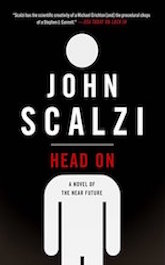FBI Agent Chris Shane is back in John Scalzi’s Head On, a quirky, complex sequel to 2014’s Lock In. First, a little background. Chris has Haden’s Syndrome, a disease where the infected is “locked in” their body. When the epidemic spread when Chris was a child, Hadens switched to living in a newly developed virtual space called the Agora. To interact with the physical world they use threeps, basically robots they can wifi into. Over the years, Hilketa was developed, wherein Hadens try to rip the heads of each other’s threep’s off in a violent sport that’s sort of a cross between soccer, rugby, and Robot Wars.
When a Hilketa player dies suspiciously on the field, Chris and their partner Agent Leslie Vann take on the investigation. The bodies pile up as leads grow cold, and nothing seems to make any sense. Bribes, arson, affairs, schemes, destroyed threeps, shady financial dealings, and one particularly important cat abound. Chris and Vann need to find out who killed Duane Chapman, but they’ll end up with an answer that’s more than they bargained for.
Buy the Book


Head On: A Novel of the Near Future (Lock in)
As good as Head On is, I absolutely loved how it picks apart socio-cultural responses to disability and gender both within the novel’s world and the reader’s. Race and gender are frequently explored in science fiction and fantasy, but disability not so much. Plenty of SFF characters have disabilities, but rarely does SFF discuss what it’s like to live with a disability in a world that won’t accommodate it, actively discourages it, or outright rejects it. Or, in the case of Head On, to be disabled in a world that does just enough to feel good about itself before finding a way to undo all its good work just to make some quick cash.
Over and over again in Head On we hear how non-Hadens are turning on Hadens. Able-bodied people and Hadens privileged enough to gain access to the abled community see Haden’s Syndrome as an obstacle. The world had to be rebuilt around the needs of Hadens, but as any minority will tell you, the majority hates having to bend to the will of those it deems lesser. It was only a matter of time before non-Hadens started resenting the affirmative action rights and protections afforded Hadens and started looking for ways to convert designated resources for mass consumption. We see that in the real world, too. Decades ago we passed the Americans with Disabilities Act to rectify years of imbalance and force change going forward, but at the same time it’s perfectly legal to pay people with disabilities less than minimum wage and employers can refuse to accommodate by claiming it’s too difficult or costly, among numerous other contradictions. The conversation Chris has with Amelie Parker, another Haden, about how her parents refused to let her participate in Haden culture reminded me a lot of the debate about cochlear implants and the impact of what it means to have a hearing person force a so-called cure on the Deaf community.
By not defining Chris’ identity in the text, Scalzi toys with our own implicit biases about who gets to be a protagonist in a science fiction story. Scalzi noted on his blog that most people (men especially) think Chris is male. I took a different tack with my visualizations. When I read Lock In back when it first came out, I pictured Kerry Washington as Chris. This time around, Chris was played by Keiynan Lonsdale. Regardless of Kerry and Keiynan’s real world gender identities and expressions, in my mind Chris has always been non-binary. Where other Hadens are explicit about their gender identity, Chris is not. Sure, some of that is Scalzi intentionally not gendering Chris, but even without knowing authorial intent, Chris still reads as NB. I also think of Chris as asexual and aromantic, mostly because they don’t flirt, don’t express interest in romance or sex, and seem to be wholly satisfied being single. But that’s just my own extra little headcanon.
I don’t fully buy the notion that for Hadens gender is secondary because their threeps are genderless. If anything, gender identity and expression is more important for Hadens—as important as it is for trans and genderqueer people in our world. The freedom to wholly define or not define your identity exclusive of social pressure is an awesome power, one most people in the real world are forcibly denied. So Chris choosing to not define themself by traditional gender constructs is a powerful act.
Hadens have physical bodies, and some fell ill when they were old enough to deal with the various social identities and hierarchies. Those who only remember being Haden regularly interact with non-Hadens, most of whom use still gendered language. How Hadens experience gender identity and expression would certainly differ from non-Hadens in many respects—not just with threeps but also in the Agora where Hadens can shape their entire existence. But I also believe they would still have to find a way to express their gender, either verbally or through physical alterations to their threep. Gender and race would remain key personal descriptors for Hadens and non-Hadens alike. Remember, Head On is near-future, not distant. No epidemic, even one as major as Haden’s Syndrome, would undo centuries of systemic gendered and racial oppression and subjugation.
Speaking of race, my only major issue lies not in the story itself but the audiobooks. I love that you can buy editions narrated by either Wil Wheaton or Amber Benson as a nod to Chris’ unspecified gender. But I most assuredly don’t love the whitewashing of Chris. Chris is Black. I mean, there’s a whole sub-subplot in Head On about how the North American Hilketa League is partly interested in both of Chris’ parents as investors because the league will look more diverse with African American backers. That implies both of Chris’ parents are African American. Now, I could be misreading the line—it’s a little jumbly—but elsewhere it’s noted several times that the dad is Black. Either way, my point still stands: CHRIS IS BLACK. Just because Chris doesn’t “look” Black doesn’t make them any less Black, as any light-skinned African American person will tell you. And just like with gender, Hadens of color would have a unique response to race but they would still be subjected to it.
So bearing all that in mind, why hire two white actors to do first-person narration for an African American character? It’s not like they there aren’t Black audiobook narrators out there. Now, I don’t typically listen to audiobooks, so maybe whitewashing narrators is standard operating procedure. If so, ugh. But if not, bigger ugh. I adore Wheaton and Benson, but this feels like a wasted opportunity for support from people who are usually pretty good allies.
Beyond the larger social context issues with the audiobook, Head On is a superb follow up to Lock In, itself a stellar novel. I knew Head On would be good, and it soared past my expectations. Although Head On can be read as a standalone, I highly recommend indulging in Lock In. It was one of my favorite reads of 2014, just as Head On has already secured a spot in my 2018 top ten. Completists should also check out Unlocked: An Oral History of Haden’s Syndrome, the prequel novella about the Haden outbreak.
With Head On, John Scalzi proves once again what an exciting storyteller he is. He deftly explores gender and disability through a rollicking science fiction crime thriller. It’s fun, fresh, and layered with meaning and interpretation. I enjoyed the hell out of it. Head On will be high on my recommendations list for years to come. Will there be a third novel? Who knows, but here’s hoping.
Head On is available from Tor Books, and a paperback edition of the prequel novella Unlocked is forthcoming from Tor.com Publishing.
Read an excerpt from Head On here.
Alex Brown is a YA librarian by day, local historian by night, pop culture critic/reviewer by passion, and QWoC all the time. Keep up with her every move on Twitter, check out her endless barrage of cute rat pics on Instagram, or follow along with her reading adventures on her blog.










